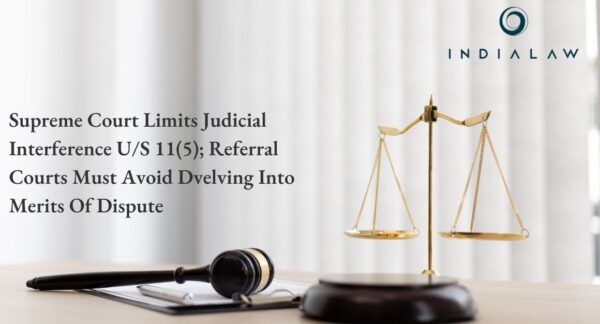SUPREME COURT STATES THAT A PETITION TO SET ASIDE AN ARBITRAL AWARD CAN BE FILED BEFORE A HC ONLY IF IT POSSESSES ORIGINAL CIVIL JURISDICTION


The Supreme Court of India, in a recent judgment1 passed by the Bench comprising of Justice M.R. SHAH and Justice M.M. SUNDRESH, held that in absence of a High Court having original jurisdiction, the concerned District Court can be said to be “Court” as defined under Section 2(e) of the Arbitration and Conciliation Act, 1996 (“Arbitration Act”)and, therefore, the proceedings under section 34, against the Award passed by the Arbitrator shall lie before the concerned District Court.
This Special Leave Petition was filed challenging the order dated 4th May, 2022 passed by the High Court of Orissa at Cuttack allowing an Arbitration Appeal and setting aside the order passed by the District Court who had dismissed the application under section 34 of the Arbitration Act as not maintainable. The High Court of Orissa at Cuttack accordingly remanded the matter to the concerned District Court to decide and dispose of Section 34 application on merits. The original respondent before the High Court filed the SLP.
The Advocate for the Petitioner relied upon Section 42 and Section 11 of the Arbitration Act, to state that the High Court, who has exercised the jurisdiction under Section 11 of the Arbitration Act alone can be said to be `Court’ and, therefore, Section 34 application shall lie before the concerned High Court only.
The said plea was absolutely rejected and the Supreme Court opined that, as in the present case the High Court of Orissa did not have original jurisdiction the concerned District Court can be considered as the `Court’ under section 2(e) of the Arbitration Act and, therefore, the proceedings under Section 34 of the Arbitration Act against the award passed by the Arbitrator shall lie before the concerned District Court.
Accordingly, the Supreme Court dismissed the Special Leave Petition stating that “the High Court has not committed any error in passing the impugned judgment and order and remanding the matter to the concerned District Court/Court to decide Section 34 application in accordance with law and on its own merits. Therefore, in the facts and circumstances of the case, impugned judgment and order passed by the High Court is not required to be interfered with.”
Notes:
Section 2(e) “Court”:
in the case of an arbitration other than international commercial arbitration, the principal Civil Court of original jurisdiction in a district, and includes the High Court in exercise of its ordinary original civil jurisdiction, having jurisdiction to decide the questions forming the subject-matter of the arbitration if the same had been the subject-matter of a suit, but does not include any Civil Court of a grade inferior to such principal Civil Court, or any Court of Small Causes;
in the case of international commercial arbitration, the High Court in exercise of its ordinary original civil jurisdiction, having jurisdiction to decide the questions forming the subject-matter of the arbitration if the same had been the subject-matter of a suit, and in other cases, a High Court having jurisdiction to hear appeals from decrees of courts subordinate to that High Court;”
Section 42. Jurisdiction:
Notwithstanding anything contained elsewhere in this Part or in any other law for time being in force, where with respect to an arbitration agreement any application under this Part has been made in a Court, that Court alone shall have jurisdiction over the arbitral proceedings and all subsequent applications arising out of that agreement and the arbitral proceedings shall be made in that Court and in no other Court.
1 Yashpal Chopra vs Union of India | 2022 LiveLaw (SC) 900 | SLP(C) 18324/2022 | 31 October 2022 | Justices MR Shah and MM Sundresh




